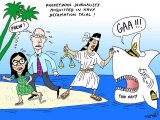Australian Alan Morison and his Thai colleague Chutima Sidasathian face up to seven years in jail for reproducing a Reuters paragraph that was part of a series on the stateless Rohingya boatpeople.
Soon after, the series won Reuters a Pulitzer prize.
Yet Reuters has failed to defend the paragraph written by its reporters and reproduced word-for-word and chosen instead to denigrate the key role played by Khun Chutima in researching aspects in Thailand of the Pulitzer-winning series.
According to Morison, Reuters ''let the little guys take the rap.''
Come Tuesday, all news agencies and other organisations such as the BBC and CNN that syndicate their articles will be watching the verdict closely because the Phuketwan journalists were charged over the paragraph's reproduction, not the Reuters reporters who wrote the words.
If the Royal Thai Navy succeeds in using criminal defamation and Thailand's draconian Computer Crimes Act to imprison or fine the journalists, governments everywhere aiming at repressing media will not be slow to assess how they too can misuse these kinds of laws.
If Phuketwan loses this case, everyone who retweets any piece of contentious information also becomes more likely to be sued.
During the trial, the point was made strongly by defence witnesses that the words ''Thai naval forces'' in the original English-language Reuters article and in reproduction on Phuketwan were mistranslated as ''Royal Thai Navy'' in the Thai-language version presented by the Navy to police and produced as evidence in court.
The Navy claimed there could be no other translation, but one expert witness pointed out that ''forces'' is plural, so clearly, the Reuters reporters also intended the phrase to cover the other Thai organisations that also have waterborne ''forces'' operating off Thailand's Andaman coast.
However, without the Reuters reporters being available to clarify what they meant, it was left to the Phuketwan journalists to defend the news agency's journalism.
Expert defence witnesses also pointed out that the Navy had not demonstrated what damage had been done to its reputation. The
Phuketwan journalists say that it is the role of journalists to make sure the public knows about serious allegations, and the role of state authorities to investigate those allegations.
It was also pointed out that instead of making a telephone call to Reuters or Phuketwan immediately on publication of the articles on July 17, 2013, to seek to express the Navy's point of view, the Navy waited months to react.
Police did not inform the journalists they were being sued until December, 2013.
Reuters, who initiated the allegations, and other news organisations who carried the same information in the Thai language have not been charged.
The Phuketwan journalists could think of no reason why they might be singled out for persecution.
As well as covering the Rohingya boatpeople saga with distinction for many years, Phuketwan had also reported on the contribution made to tourism safety by the Royal Thai Navy.
Before being charged, the journalists had even recommended that the Navy, with its good reputation for environmental protection, take a more direct role in protecting and maintaining Phuket's beaches.
Surprisingly, although the verdict in the case has most direct effect on the future of the media in Thailand, the Thai media has not shown great interest in the case.
Yet the action by the Royal Thai Navy came before the military takeover of the country, so any future use of these laws could follow even after a democracy has been restored in Thailand.
It's the first time the Computer Crimes Act - which was intended for use against computer hackers and data base thieves - has been used against journalists by the military. If it succeeds, it may not be the last.
Reuters and Phuketwan
THE TWO Phuketwan journalists being sued by the Royal Thai Navy over a Reuters paragraph are both appalled by the news agency's approach. Reuters' corporate response in ''standing by'' their own article ignored the fact that the charges were laid not over the Phuketwan article, but specifically over a 41-word paragraph, reproduced accurately from the original Reuters report. The journalism that won the Pulitzer was excellent and the reporters deserved Reuters' praise for their ''courage'', but the corporate response by Reuters to the Phuketwan suit showed little understanding of what the word means. In playing down the role of Khun Chutima, who had been reporting on the Rohingya saga for years before the Reuters' journalists asked her for help as a ''fixer,'' Reuters tarnished its prize. Journalists usually support each other. That's precisely what Phuketwan had been doing in helping Reuters and many other international organisations to accurately report the boatpeople issue. In the unlikely event of Reuters being sued at this late stage over its paragraph, a judge might well ask why the news agency previously chose not to defend the exact same paragraph.
Phuketwan and Australia
THE LACK of an appropriate response by the then Australian ambassador to Thailand meant that the Royal Thai Navy charges proceeded without objection. Morison believes that a proper reaction by the ambassador at the time - in December and January 2014, coincidentally as the television documentary 'The Embassy' was being filmed - could have prevented the Prosecutor accepting the case. The Australian Government also declined to follow the lead of the British Government, which obtained the return of the passport of Andy Hall and declared him to be a ''human rights defender.'' The Foreign Minister, Julie Bishop, has yet to clarify what she meant when she told Morison's sister Jenny Braddy in December that Morison in his own best interests simply had to apologise as Andy Hall had done. Andy Hall has never apologised in the series of cases brought against him by Natural Fruit, and Morison also has no intention of apologising for something he hasn't done. This year, consular assistance from the Australian embassy has been of the highest quality and the present Australian Ambassador, Paul Robilliard, even raised the case with Thailand's Prime Minister, Prayuth Chan-o-cha.
WATCH the Dateline documentary
The Dateline documentary team from SBS Australia shared the three-day trial of Alan Morison and Chutima Sidasathian with participants for a show full of revealing insights.
http://www.sbs.com.au/news/dateline/story/thailands-moment-truth
Reuters' Response
DATELINE put the following questions to Reuters regarding this story:
1. Is it correct that Reuters has not offered support to Alan Morison and Chutima Sidasathian? If not, why not?
2. Is it correct that Sidasathian assisted Reuters in the investigation for which Reuters was subsequently awarded a Pulitzer Prize in 2014?
3. Has Reuters made any public statement defending the Reuters original report and condemning the fact that journalists are being persecuted for reprinting an extract from that report?
4. Are you aware of any complaint made by the Royal Thai Navy about Reuters's original publication of the article?
David Crundwell, Senior Vice-President of Corporate Affairs at Thomson Reuters, responded with this statement:
''Reuters wholeheartedly supports a free press and the imperative of journalists across the world to publish independent and reliable news, however the case against Phuketwan arose out of aspects of our story being excerpted by Phuketwan from our original and comprehensive story.
As part of writing our story, we asked Chutima to assist in arranging appointments for our journalists as part of our news gathering. She did not act as a Reuters journalist or stringer, and her contribution to the story was limited to arranging these appointments. We appreciate the role that local journalists like Chutima often play in assisting international news organizations like ourselves in accessing information.
Reuters strongly objects to the use of criminal laws anywhere in the world to attempt to punish journalists for the important and valuable work that they do.
On the charges against Reuters, we are aware that a captain in the Royal Thai Navy filed a criminal complaint against Reuters and two Reuters journalists, Stuart Grudgings and Jason Szep, arising out of the Rohingya coverage, and that the complaint alleges violations of the Computer Crimes Act. Based on our understanding, the complaint is under review by the authorities, but we have not been charged. We hope that the Captain and the Navy will reconsider the lawsuit against Reuters in light of the Thai officials' subsequent acknowledgement of the seriousness of the problem, their efforts to combat trafficking, and Reuters' contribution to the authorities having released 900 trafficking refugees from trafficking camps in Thailand.
We stand by the fairness and accuracy of our Rohingya coverage, support the principles of a free press everywhere in the world - and the rights of journalists to go about their jobs without fear or hindrance in reporting the truth.''
WATCH Journey into Hell, by Four Corners
From Burma through Thailand, an award-winning current affairs team traces official complicity in the brutal treatment of the Rohingya and Phuketwan's part in its exposure.
http://www.abc.net.au/4corners/stories/2015/06/22/4257490.htm
WATCH How Trafficking Works
Phuketwan Investigative reporter Chutima Sidasathian says of traficking in 2014: ''It's worse and worse, day by day. Nobody cares''.
http://journeyman.tv/67116/short-films/rohingya-hd.html
LISTEN The Rohingya Solution
A tragedy almost beyond words has been unfolding in Thailand, where a human smuggling network is thriving with the full knowledge of some corrupt law enforcement officers. Alan Morison of Phuketwan talks to Australia's AM program.
http://www.abc.net.au/am/content/2015/s4231108.htm



















With respect. A 'foreigner' will never understand Thai culture. Because in the eye of every Thai there is no other culture. Except where an advantage can be gained by a Thai. Read some history, ask a Thai to consider another point of view and see where you end up.
Bigot you say, often enough. Consider the Australian view, ubiquitous Nationalist kodus and the ethnic segregation in 21st century Australia, it may help you to understand Thainess.
The very best of luck with you ongoing struggle to conform.
Just say sorry. It's the Thai way.
Posted by gee on August 30, 2015 14:41
Editor Comment:
The report is by a Thai and a non-Thai, gee. This is not about Thai-ness but about justice. If you see it as an issue of Thai-ness, you have missed the point.